East Asia Pacific Economic Update, April 2018: Enhancing PotentialEast Asia and Pacific (EAP) grew slightly faster than anticipated in 2017, with growth in Myanmar rebounding slightly at 6.4% due to strong exports. Amid risks to macroeconomic stability, EAP countries must enhance trade facilitation and integration, improve education systems, and upgrade capabilities of workers and managers. Author: World Bank Year: 2018 Download Tags: Exports, GDP, India, Manufacturing, Myanmar, Poverty Reduction, Trade Facilitation, WB Climbing Higher: toward a Middle-income NepalNepal is experiencing modest growth but brisk poverty reduction. It has halved the poverty rate in just seven years and witnessed an equally significant decline in income inequality. Yet Nepal remains one of the poorest and slowest-growing economies in Asia, with per capita income falling behind its regional neighbors. The report discusses the need for comprehensive policy reform to address the country’s challenges in becoming a lower-middle-income country by 2030. The report outlines suggested reforms to facilitate greater investment and improved productivity, build new sources of growth, and deepen human capital. Author: World Bank Group Year: 2017 Download Tags: Employment, Investment, Nepal, Poverty Reduction, Trade, Transport, WB 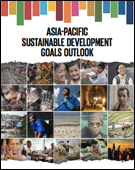 Asia-Pacific Sustainable Development Goals OutlookThis outlook report on the Sustainable Development Goals (SDG) offers an overview of the issues confronting the Asia and the Pacific region in eradicating poverty. Calling for greater synergies and collaboration, this report underscores that climate change and growth policies, including initiatives to improve access to energy and other forms of infrastructure, must also correspond to poverty-reduction strategies. The first knowledge product under a renewed partnership between the Economic and Social Commission for Asia and the Pacific, the Asian Development Bank, and the United Nations Development Programme, this report brings together experts and practitioners in the hope of inspiring new ideas to achieve the 2030 agenda. Author: United Nations Economic and Social Commission for Asia and the Pacific, Asian Development Bank, and United Nations Development Programme Year: 2017 Download Tags: Regional Cooperation, Trade Facilitation, Poverty Reduction, South Asia 2016 Development Effectiveness ReviewThe Development Effectiveness Review tracks development progress in Asia and the Pacific and monitors the Asian Development Bank’s (ADB) effectiveness 2010-2016. For South Asia, ADB shares results in regional cooperation, energy, and road and rail transport. ADB also approved $4.4 billion in financing for projects in South Asia during 2016. The Review includes details of ongoing and newly approved projects. Author: Asian Development Bank Year: 2017 Download Tags: ADB, Asia-Pacific, Development, Poverty Reduction, Regional Cooperation, Regional Integration, Roads, Transport, Bangladesh, Bhutan, India, Maldives, Nepal, Sri Lanka Trade and the Post-2015 Development AgendaTrade and services are instrumental in achieving the Sustainable Development Goals. While openness to trade improves economic growth prospects, sound trade policy and efforts to reduce the costs of trade are necessary to bridge the link between trade growth and poverty reduction. For low income countries, there is still great scope to leverage trade for development, and pursue better access to a products and services to improve welfare, which can significantly contribute to economic development. In keeping with the post-2015 development agenda, this paper recommends sustained efforts by governments to reduce trade costs, support policy reforms to improve services trade, and focus on trade cost reduction and services trade facilitation. Author: Bernard Hoekman Year: 2017 Download Tags: Trade Facilitation, Services, Sustainable Development, Poverty Reduction, ADB 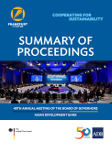 Summary of Proceedings of the 49th Annual Meeting of the Board of GovernorsThis publication provides a summary of the proceedings of the 49th Annual Meeting of the Asian Development Bank (ADB) Board of Governors, held in Frankfurt, Germany from 2-5 May 2016. It also includes statements from the Governors of ADB member countries, including SASEC countries. In his address, Mr. Abul Maal Muhith, Governor, Bangladesh, called for further acceleration of ADB's regional cooperation and integration strategy, which could play a critical role in accelerating economic growth, reducing poverty and economic disparity, and raising productivity and employment and environmental sustainability in Bangladesh, and lauded ADB's support in the signing of the landmark Bangladesh-Bhutan-India-Nepal Motor Vehicle Agreement (BBIN MVA). Mr. Arun Jaitley, Governor, India, highlighted India's strong and renewed commitment to regional cooperation in South Asia, which was demonstrated with the signing of the BBIN MVA and ongoing negotiations for the India-Myanmar-Thailand Highway. He also emphasized partnership between ADB and India in the development of the East Coast Economic Corridor, with initial focus on the ‘Vizag Chennai Industrial Corridor’, which will play a major role in connecting India to global production networks and value chains in the ASEAN region. Author: Asian Development Bank Year: 2016 Download Tags: ADB, Bangladesh, India, Regional Cooperation, Poverty Reduction ADB 2015 Development Effectiveness ReviewThe Asian Development Bank (ADB) is committed to implementing reforms to reach its goals to be a bigger, faster, and stronger development institution. The 2015 Development Effectiveness Review is the annual performance report of the ADB. It tracks development progress in Asia and the Pacific and monitors ADB's effectiveness. The report also takes a look at rapid gains made by ADB developing member countries and examines the challenges that lie ahead. Planned reforms laid out in the book include those that tackle sustainability issues internally and in developing member countries. Author: Asian Development Bank Year: 2016 Download Tags: Development, Asia-Pacific, Poverty Reduction, ADB 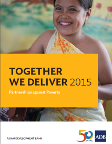 Together We Deliver 2015: Partnerships against PovertyThis book gathers 14 stories from across Asia and the Pacific that highlight successful projects demonstrating development impact, best practices, and innovation. It includes stories from Bangladesh, India, Nepal, and Sri Lanka that illustrate how the Asian Development Bank (ADB) and its partners, with their combined expertise, problem-solving abilities, and finances lift people’s living standards and solve a variety of pressing development problems. In India, Mumbai’s new Chhatrapati Shivaji International Airport is a shining example of how public–private partnerships can help solve the country's infrastructure deficit, increasing efficiency in cargo and passenger handling and saving on energy costs. In Bangladesh, partnership between ADB and nongovernment organizations is bringing health care to the urban poor. In Nepal, a Skills for Employment project is helping those caught in poverty improve their job prospects. In Sri Lanka, ADB and its development partners helped provide a fresh start through electricity, education, health services, and water sanitation.
Author: Asian Development Bank Year: 2016 Download Tags: Public Private Partnerships, Transport, Water Sanitation, Employment, Poverty Reduction 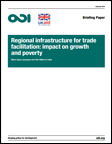 Regional Infrastructure for Trade Facilitation: Impact on Growth and Poverty Reduction - Policy SummaryThis research aims to provide evidence on the effects of regional infrastructure and associated trade cost reduction on growth and poverty reduction of economic actors, including households and firms, around the border. Data shows that investment in regional integration for trade facilitation (RITF) promotes economic activity, supports activity of informal traders, and facilitates integration into global value chains and international production networks. The report highlights that new hard infrastructure benefits economic actors more when complementary regulations that allow for efficient trade logistic services are also put in place. It recommends that policymakers account for the impact of RITF on reducing constraints to connectivity in their evaluations and policy decisions. Author: Marie-Agnes Jouanjean and Dirk Willem te Velde Year: 2015 Download Tags: Trade Facilitation, Global Value Chains, Poverty Reduction 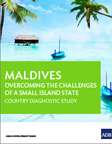 Maldives: Overcoming the Challenges of a Small Island State – Country Diagnostic StudyThe Maldives has propelled itself to middle-income status despite the geographic constraints and challenges of a small-island state. It has one of the lowest poverty rates in South Asia, although wide regional disparities in poverty rates and high-income inequality continue to be a concern. Growth – primarily driven by the tourism sector – has also been vulnerable to external shocks. As the Maldives moves toward a more sustainable and inclusive growth strategy, transport infrastructure is critical to help address the country’s connectivity issue and reduce the cost of doing business. This report identifies the critical constraints to inclusive growth in the Maldives and provides policy recommendations to sustain economic growth and hasten poverty reduction. Author: Asian Development Bank Year: 2015 Download Tags: Maldives, Small Island Developing States, Transport, Connectivity, Policy, Poverty Reduction, South Asia, Tourism Economic and Social Survey of Asia and the Pacific 2014This 2014 edition of UNESCAP's flagship publication emphasizes the importance of furthering regional connectivity in Asia-Pacific—a region which, despite significant reductions in poverty levels, is now witnessing rising income inequality, both within and between countries. It calls for driving the region's growth by exploiting the interdependence and synergies of five elements: trade and transport connectivity, ICT networks, energy connectivity, people-to-people networks, and promotion of knowledge-based economies, and advocates approaching connectivity as a regional public good. Author: UNESCAP Year: 2014 Download Tags: Economic Integration, Regional Cooperation, Poverty Reduction, Asia-Pacific, Connectivity, Energy, ICT, Bangladesh, Bhutan, India, Maldives, Sri Lanka, Trade, Transport, UNESCAP 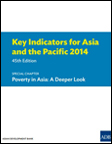 Key Indicators for Asia and the Pacific 2014This year's edition presents an in-depth inquiry on poverty in Asia, tackling whether the $1.25/day extreme poverty standard still accurately depicts minimum living standard of the poor in Asia and the Pacific. Using this broad measure, the poverty rate is projected to fall to 24.5% for South Asia by 2030, if recent economic growth trends continue. However, considering the current national poverty line average among today's less developed economies in the region, an Asia-specific extreme poverty line is more accurately estimated at $1.51/day, increasing Asia’s poverty rate in 2010 by 9.8%, and ��of a large economy like India by 15%. Hence, despite huge gains made, reducing poverty remains a pressing challenge in Asia and the Pacific. This book proposes several measures to counteract worsening poverty, including �close �regional cooperation which can reduce a country’s vulnerability, and urgent policy actions that promote economic growth and prioritize climate change adaptation and mitigation. Author: Asian Development Bank Year: 2014 Download Tags: Poverty Reduction, Disaster Risk, Regional Cooperation, Asia-Pacific, Bangladesh, Bhutan, Economics, Energy, India, Maldives, Milennium Development Goals, Nepal, Sri Lanka, Sustainability, Transport Green Power for Bhutan: Clean Energy Crosses Borders to Reach Poor HouseholdsConstructed under the ADB-financed Green Power Development Project, Bhutan's Dagachhu hydropower plant showcases how a public–private partnership for hydropower development successfully promotes cross-border energy trade, contributes to increased national energy security, and improves access to on- and off-grid energy for 9,000 rural households and public facilities. This report reviews the project's key features and discusses how an investment in renewable energy infrastructure is leading Bhutan and its neighboring countries toward greater inclusive growth. Author: Asian Development Bank Year: 2014 Download Tags: Energy, Infrastructure, Poverty Reduction, Bhutan, ADB RCI 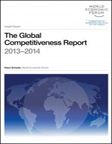 Global Competitiveness Report 2013-2014The World Economic Forum's Global Competitiveness Report offers a platform for dialogue among key stakeholders in government, business, and civil society on improving the living standards of the world’s citizens through insights on institutions, policies, and factors that drive or hinder growth and national competitiveness. Using the Global Competitiveness Index (GCI), twelve pillars are considered, including infrastructure, which, among factor-driven economies of Bangladesh, India, and Nepal, impacts the location of economic activity, reduces distance between regions, and enables production and faster flow of goods. Market size—essential for countries with small domestic markets—is another key index measured. The 2013-2014 report also includes an assessment of newly-covered Bhutan, and an analysis for the drop in India's GCI ranking. Author: Klaus Schwab Year: 2014 Download Tags: Economics, Poverty Reduction, Infrastructure, Bangladesh, Bhutan, Energy, India, Nepal, Sri Lanka, Transport SAARC Biz: The Inevitability of South Asia SAARC Biz is a monthly publication of the SAARC Chamber of Commerce & Industry and features a report on the 'Inevitability of South Asia'. While the term 'South Asia' is commonly accepted, it argues that regionalism is far from being implemented on the ground. For instance, SAARC was accepted as a concept of cross-border regionalism but was hobbled due to budget constraints and restrictive mandates. Connectivity across national frontiers is needed to jump-start regionalism and improve lives in the most deprived parts of the Subcontinent. Author: SAARC Chamber of Commerce and Industry Year: 2014 Download Tags: South Asia, Regional Cooperation, SAARC, Industrialization, Regional Integration, Poverty Reduction, Gender, Least Developed Countries, Connectivity, Agriculture, Bangladesh, Youth, India, Environment, Investment, Tourism, Renewables 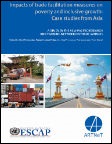 Impacts of Trade Facilitation Measures on Poverty and Inclusive Growth: Case Studies from Asia - A Study by the Asia-Pacific Research and Training Network on TradeThis book addresses the gap between trade facilitation and poverty reduction and contains a compilation of specific case studies that explores the linkages between trade facilitation measures and poverty. It also presents cross-country analysis that examines inequality in low- and middle-income countries. Other chapters discuss economic corridors and microfinance development as trade facilitation measures and examine access to trade facilitation by export-oriented micro, small, and medium-sized enterprises. It also explores barriers to international entrepreneurship for the vegetable business in Bangladesh. Finally, it offers a comprehensive evaluation of the effectiveness of Export Processing Zones (EPZs) on poverty reduction. Author: Ravi Ratnayake, Rajan Sudesh Ratna, Martina Francesca Ferracane and Yann Duval Year: 2013 Download Tags: Trade Facilitation, Bangladesh, Trade, Poverty Reduction, Economic Corridor, Small and medium enterprises, India, SAARC, Customs, Pakistan Aid for Trade: An Investment Benefit Road Map for South AsiaAid for Trade (AfT) came to prominence just over a decade ago at the launch of the
World Trade Organization's Doha Round. With its focus on helping least developed
countries and economies escape the poverty trap, it aims to strengthen their
capabilities to meet market demand and to reduce supply-side constraints such as a lack of
trade infrastructure. Author: Asian Development Bank Year: 2013 Download Tags: Trade Policy, Poverty Reduction, Infrastructure, India, Bangladesh, Bhutan, Maldives, Sri Lanka, Nepal, Trade Facilitation, Transport, Global Value Chains, Exports Climate Action South Asia: Information Update No. 3 (The Economics of Climate Change in South Asia: Adaptation and Impact Assessment)Analyses show that the cost of early action on climate change in South Asia is lower than
the cost of damage brought about by climate change impacts. In physical terms, the region
will face water shortage and agricultural food production losses, which are vital to achieving
poverty reduction and other Millennium Development Goals (MDGs). Author: Asian Development Bank Year: 2013 Download Tags: Economics, Climate, Agriculture, Climate Change, Environment, South Asia, Milennium Development Goals, Sustainability, Bangladesh, Bhutan, India, Nepal, Maldives, Poverty Reduction, Hydropower, Energy Regional Cooperation and Integration Through Cross-Border Insfrastructure Development in South AsiaThis paper aims to identify the links between cross-border infrastructure development and poverty reduction. With South Asia being home to around 40% of the world's poor, there is a great need to boost intraregional trade through greater cooperation and integration. Regional integration promises to increase the region's capacity to connect with global production networks and participate in the global economy with greater efficiency. Author: P.V. Srinivasan Year: 2011 Download Tags: Regional Cooperation, Regional Integration, South Asia, Bangladesh, Bhutan, India, Maldives, Nepal, Sri Lanka, Poverty Reduction The Provision of Regional Public Goods in South AsiaThis report reviews the provision of high priority regional public goods (RPGs) selected
for the South Asia subregion, and proposes areas of cooperation for improving the provisioning of RPGs in South Asia. It highlights the issues in cross border management of infrastructure projects and best practices in the provisioning of RPGs relevant for South Asia, evaluates ADB’s contributions to providing RPGs in the subregion, and concludes with recommendations on ADB’s South Asia Regional Department’s role in the provision of RPGs in the subregion. Author: Khaja Moinuddin Year: 2010 Download Tags: Energy, Agriculture, Disaster Risk, Governance, Poverty Reduction, Bangladesh, Bhutan, India, Maldives, Nepal, Sri Lanka, Trade Facilitation, Transport |



